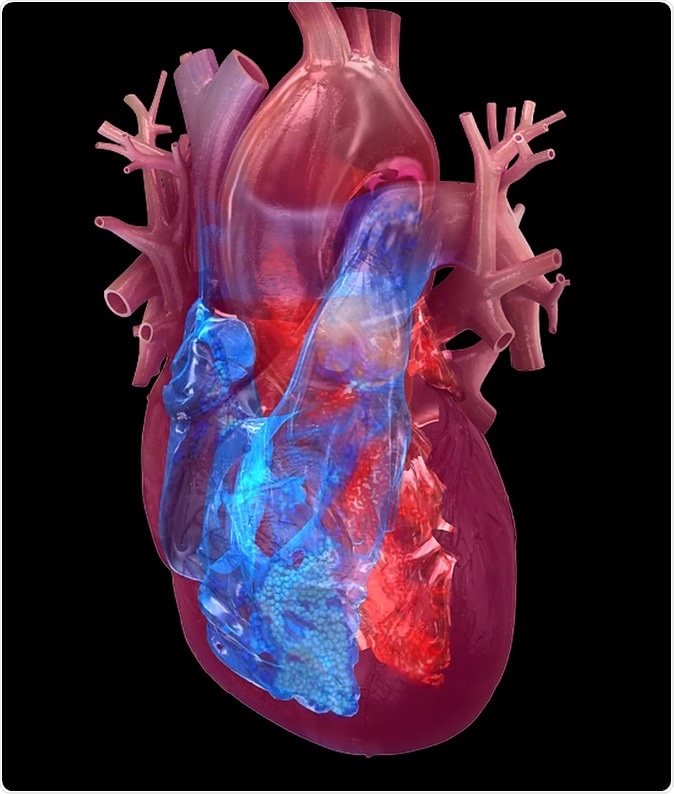
4 chambers of the heart: right atrium, right ventricle, left atrium, left ventricle. Copyright American Heart Association
For this study and to draw conclusions, the team had to investigate the heart health of a large number of women. They included over 65,000 postmenopausal women for their analysis and the average age of the study population was 63 years. These women and their data was part of the Women’s Health Initiative study.
Based on the classification, they noted that 13 percent of the participating women had poor cardiovascular health. Now they extrapolated these women with their professions and found several jobs were common among these women. This helped the team arrive at conclusions that certain jobs could be bad for women’s heart health.
The team of researchers have specifically found that women who work as social workers are 36 percent more likely to have a bad heart when compared to other professions. Further women nurses (14 percent), health aides and retails cashiers (33 percent) had more health problems found the study.
Specifically women in health care roles had a 16 percent raised risk of heart disease, the calculated. On the other hand women working in the real estate are 24 percent less likely to have heart problems and women working as administrative assistants were 11 percent less likely to have heart problems.
To account for other factors that could increase the risk of poor heart health, the team adjusted for background factors such as age, educational status, marital status, and ethnicity or race.
This study proves that certain professions are worse in terms of heart health for women compared to others. Bede Nriagu, a research fellow in epidemiology and biostatistics at the Dornsife School of Public Health at Drexel University in Philadelphia, Pennsylvania, an first author of the study said, “Several of the professions that had high risk of poor cardiovascular health were health care providers, such as nurses and home health aides.
This is surprising because these women are likely more knowledgeable about cardiovascular health risk factors. We interpret this to mean that it’s important to look beyond individual factors such as health knowledge to better understand the context of health care and other jobs that negatively impact cardiovascular health in women.”
Nriagu said this study proves that profession of a woman could be important in terms of determining her heart health risk and physicians need to be aware of it when they identify women at risk. He called for further research to look at the occupational exposure as one of the markers for poor heart health.
Second study
Another team of researchers from Columbia University, New York, found that women who are into late dinners or into frequent heavy evening snacking are at a greater risk of heart disease. The results of the study are also to be presented in the American Heart Association’s Scientific Sessions 2019 to be held in Philadelphia between November 16th and 18th.
The team found that women who had most of their calorie intake in their dinners or in the late evening snacks are more likely to have a greater heart disease risk. For this study the team included 112 women who were examined at the start of the study for any signs of heart disease and then again at the end of one year. Their average age was 33 years. At the beginning of the study the women were asked to record what they ate for each day of one week. This week-long exercise was repeated again at the end of the year of the study.
Results revealed that most of the women ate something after 6 PM in the evening. Some of them consumed higher calories while others consumed usual food. Lead author of the study Nour Makarem, a Columbia University, Irving Medical Center associate research scientist, explained that the women who ate higher number of calories in the evening showed poor heart health markers at the end of the study compared to women who ate regular low calorie food. The numbers revealed that for each 1 percent rise in calories consumed after 8 PM, there was a significant decline in heart health.
Makarem explained, “We evolved to adopt a 24-hour light and dark cycle, meaning we eat and are active during the day and we sleep at night...But our more demanding work schedules and commutes push everything later and now we are eating at unconventional times.” She added, “When the clocks in the organs become misaligned with the master clock in the brain, it creates a state of metabolic dysfunction, which can increase the risk of heart disease... If we’re eating late at night, we’re not metabolizing the food as well as we would during the day.”
Women who were consuming more calories in the evening were found to have higher body mass index, higher blood sugar and blood pressure. Makarem said in a statement, “So far, lifestyle approaches to prevent heart disease have focused on what we eat and how much we eat.” This is the first study that shows, when we eat the food could also be important. She said that shifting the eating time could be a “simple, modifiable behavior that can help lower heart disease risk”. The team recommends that calorie intake after 6 PM in the evening should be less than 30 percent of the total calorie intake in 24 hours.
https://newsroom.heart.org/news/specific-jobs-linked-to-poor-heart-health-for-women?preview=16aa






No comments
Post a Comment